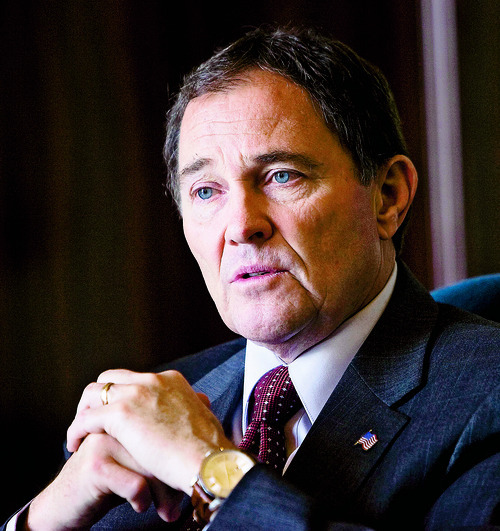This is an archived article that was published on sltrib.com in 2012, and information in the article may be outdated. It is provided only for personal research purposes and may not be reprinted.
Utah Gov. Gary Herbert has called the Legislature into a special session Wednesday to approve the issuance of 90 new liquor licenses for restaurants, hoping to alleviate a scarcity that developers have said is hindering expansion.
He also asked lawmakers to plug a $25 million hole in the education budget, address rules in the Attorney General's Office regarding the hiring of outside counsel and expert witnesses, and remove from the November ballot a non-binding question of whether voters support a sales-tax increase for cultural programs.
"One vital economic development matter needing timely resolution is the number of liquor licenses available statewide. We also need to address the Office of Education's technical error and shortfall of $25 million," Herbert said. "By addressing these issues now, we will provide a more efficient legislative process, greater certainty in the marketplace and assurances to schools and parents that our children are the priority."
Legislators are already scheduled to be at the Capitol on Wednesday for regularly scheduled interim meetings.
Sen. John Valentine, R-Orem, said his bill, which has been under negotiation for weeks, would create 50 new full-service restaurant licenses and 40 new limited restaurant licenses for those establishments that only serve beer and wine.
To balance that out, Valentine said his bill will add four new compliance officers at the Department of Alcoholic Beverage Control to conduct oversight and enforcement on the newly licensed restaurants.
And there will be funds to put additional highway troopers on the road. Valentine said the funding will allow the Utah Highway Patrol to pay troopers overtime to create 12 additional shifts on weekend patrols.
Senate President Michael Waddoups, R-Taylorsville, had been a long-standing opponent of expanding the number of licenses available. He said data he had seen from DABC showed that youth were getting alcohol in two places — at home and at restaurants. But the enforcement components make Valentine's bill acceptable.
"I said, 'Why do we want more restaurant licenses when that's where the violations are coming from?' And they came back and said, 'We really need it for economic development,' and I said, 'No,'" Waddoups said. "And they came back and said, 'What will it take,'" and I said, 'More enforcement on selling to minors.'"
"I think I'm getting something out of it too," he said, adding that there is also a commitment from legislators and others involved to look at increasing the penalties on sales to minors.
Waddoups said he plans to personally testify at the committee hearing on the bill Wednesday, to drive home the importance of the enforcement piece.
His bill would also postpone a provision due to kick in July 1 that would have allowed restaurants to sell their license when they sell the establishment. There was concern that the scarcity of licenses would create a high demand and drive up the prices.
Valentine said he has been in active discussions with the governor's general counsel John Pearce and chief of staff Derek Miller.
"I've not had an eyeball-to-eyeball meeting [with the governor], but have been informed that the governor is agreeable to the changes," Valentine said.
Legislators are also expected to address a $25 million shortfall in the budget, the result of an accounting error at the Utah State Office of Education that caught the governor and lawmakers off guard after the end of the last legislative session.
Legislators believe they can scrape together unused funds from other departments to provide a temporary fix to the problem and come up with a permanent solution when they meet next year.
Legislators will also consider legislation that was proposed last year that requires the Attorney General's Office to create rules regarding the hiring of outside counsel and expert witnesses.
The bill sought to require the attorney general to disclose information when it hired law firms or witnesses, but a rule at the time did not require the information to be made public. The Senate made a minor amendment to the bill, but the House voted on the wrong version so it didn't pass.
In March, the attorney general's office enacted a rule requiring some information about contracts with firms and witnesses to be available publicly.
Lawmakers will also be asked to take a non-binding question off the ballot, which would ask voters if they would support a sales tax hike to support arts, museums and cultural activities. There was concern that there might be too many questions on the ballot come November and it might affect the outcome of other votes, said Ally Isom, the governor's spokeswoman.
The governor is also asking lawmakers to make minor changes to the state's accreditation system for nurses.



